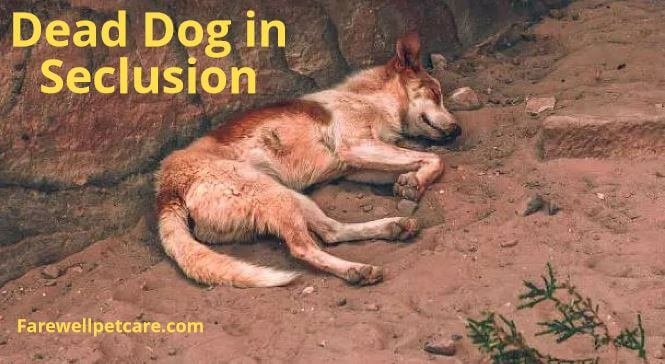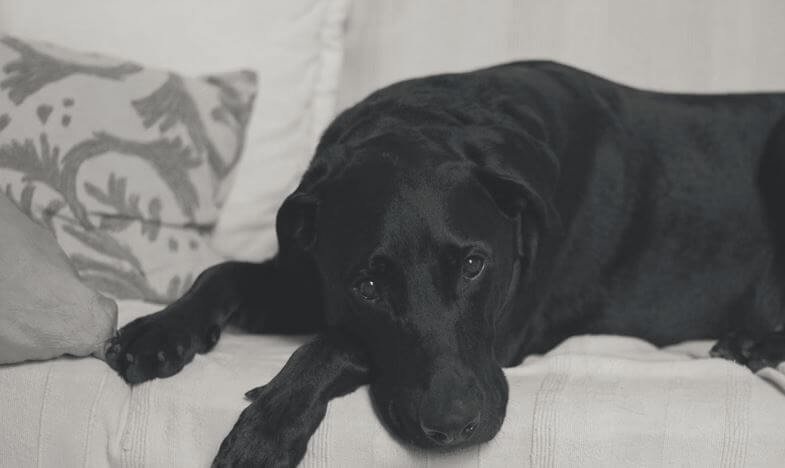For some reason, sick dogs separate and wander in solitude to rest in a quiet place. Dogs approaching their end of life are particularly the culprits of this ordeal. Seeing your dog behave as such is pretty puzzling, and you may wonder, do dogs prefer to die alone?
Although dogs don’t prefer to die alone, some may wander in seclusion because of impaired vision and cognitive dysfunction. Naturally, the dog feels weak, and fears ambush from other predators when dying. When your dog nears death, he will want you to be around to offer comfort and love.
Keep reading to understand why your dog may prefer to die alone. Additionally, you will know how to help your dog transition peacefully into the afterlife.
Do Dogs Prefer to Die Alone? The Causes of this Behavior and What to Do

Dogs are expectedly instinctive animals that listen to their bodies. They can know when they are sick or weak. That said, a dog nearing death can hide for various reasons, including the following:
1. Cognitive Dysfunction Syndrome
Cognitive dysfunction syndrome is a common problem in old-age dogs. The condition affects your dog’s brain, making him lose mental stability. It’s similar to what humans experience with Alzheimer’s disease.
As your dog enters old age—usually from the 9th year – brain deterioration begins to occur, albeit gradually. The syndrome causes gradual behavioral changes. Several dog owners may confuse these symptoms with the normal aging process.
The leading cause of cognitive dysfunction syndrome is degenerating brain function. According to biology, specialized cells called neurons control all brain functions – regulating your dog’s mental and physical states.
As the dog ages, the neurons also begin to waste away thanks to beta-amyloid buildup. Beta-amyloid is the protein synthesized as your dog starts to age. This protein is toxic to neurons, rendering them non-functional or even causing them to die.
Once neurons are down, your dog’s brain loses its processing capacity. Hence, the dog cannot process information, leading to unfamiliar physical and behavioral changes you may see.
Some of the changes dog owners often observe in their aging dogs include:
- The dog doesn’t recognize people he knew before
- The dog is disoriented. He easily gets lost, even in places he knows well. He could simply stare into space or get stuck in a corner.
- The dog’s sleep pattern changes, and he may wander the house at night and sleep the entire day.
- Unlike how he was trained, he soils the house, urinating or defecating anywhere indoors.
- The dog develops increased anxiety, irritability, and aggression.
- The dog shows less or no interest in playing with others or people.
- The dog becomes restless, always looking for new places to stay alone.
- The dog no longer actively responds to familiar commands. In fact, he may fail to respond altogether.
What to Do:
Fast forward, call your veterinarian the moment you notice such symptoms. The vet will perform a physical examination of your pet. Besides, he may run tests to verify if the clinical signs are related to cognitive dysfunction syndrome.
Usually, treatment options for this condition are centered around the following aspects;
- A special diet: Provide your dog with a prescription diet recommended by the vet. Examples of these diets include Hill’s B/D, Royal Canin Veterinary Mature Consult, and Purina Proplan Neuorocare.
These diets are rich in essential nutrients such as antioxidants and fatty acids that support brain development.
- Medications: Your vet should recommend suitable medications for your dog. In North America, selegiline is commonly used for CDS treatment. Besides the main medications, your vet could identify other secondary issues and provide dog antibiotics for the same.
- Engage your dog: being available for your sick dog can help stimulate his brain. Use varied methods like interactive toys, playing with him regularly, and exercise.
- Provide diet with supplements: Combine your dog’s diet with a mix of high-quality supplements recommended by the vet. Some supplements to give your dog include Senilife, Novofit, or Aktivait.
Take note that cognitive dysfunction is a gradually progressive disease in old dogs. The condition is easily managed when detected early.
2. Safety Reasons
Most dogs recede to seclusion when about to die in search for protection. Thanks to their physical decline, they sense frailty in their body. Hence, the dog may experience a fear of being attacked by another individual.
Moreover, the natural dog’s instincts are not entirely wiped out from the domesticated dog. They still know it’s possible to encounter an attack. In the wild, dogs seek shelters to hide when sick. That said, hiding or preferring to stay alone is a defense strategy.
Meanwhile, depending on the trigger, this behavior can vary from one dog to another.
What to Do:
- Enhance socialization: Make sure that you show your dog love and care. Don’t stop playing with him and other pets because of their condition. In fact, social interactions can help improve your dog’s mental health because social activities stimulate the mind and brain.
- Embrace firm warnings and radical punishments: Don’t punish your dog with aversives even if you think he made a deliberate mistake. You can talk to him firmly but don’t hurt or scare him.
- Be patient with your dog: If the dog keeps hiding from you, you may be tempted to get angry and start pushing him around. Instead, remain patient and give your pooch enough time to recollect his senses.
Also Read: Why Is My Female Dog Whining So Much? (8 Reasons and What to Do)
3. Illness or Disease
When some dogs fall sick, they hide to avoid medications.
Unsurprisingly, not all dogs will love the process of administering drugs. Some will find the methods disgusting, and the best way to avoid such treatment is by hiding and staying alone.
Think of the time when your pooch went missing. If you found him under the couch or seat, he was probably hiding as he knows the suffering he’s currently undergoing.
Your dog can suffer from various diseases like:
- Cancer
- Diabetes
- Kennel cough
- Parvovirus
- Rabies
- Ringworm
Most of these diseases are highly contagious and fatal when not treated early.
What to Do:
- Contact your veterinarian: After you notice that your dog is sick – which is why he’s hiding – call your vet immediately before symptoms worsen to get their advice. Alternatively, take the dog to the vet for examination, tests, and medication.
- Keep your dog comfortable: Minimize distractions and things that disturb your dog’s peace. Ensure he gets enough rest while providing high-quality dog food and clean water. Most importantly, keep your dog warm by covering him with an extra blanket.
- Medication schedule: Administer medications as per the vet’s prescription. Don’t give him over-the-counter dog medications without veterinary advice.
4. Stress and Pain

When stressed, your dog may feel like hiding somewhere to rest or unwind from stressors.
Similarly, pain or discomfort can frustrate your pooch. When these situations pressurize him, he might withdraw from all social interactions and seek solitude as a coping mechanism.
Furthermore, stress or pain breaks the dog’s social dynamics balance. So, when he doesn’t feel well mentally or physically, he withdraws naturally to avoid being seen as a weak link in the family.
Not all dogs will hide due to stress—some will seek comfort, and you should always be ready and available to offer it.
What to Do:
Provide regular care and minimize stressors to create a peaceful environment for the dog. You can do this by separating the dog from the rest of the pets and finding him a quiet place where you’ll provide care and treatment.
Also, consult with your vet to see if he can help you manage the dog’s pain or discomfort he may be experiencing during this time.
5. Your Dog Is Scared
As mentioned, a dog’s instinct tells him when his body develops issues. He becomes aware he’s weak and may reach the end of his life soon. So, the dog takes a position he knows that he’ll peacefully pass on without being distracted—but all the same, he’s scared of dying.
If the condition he suffers from leads to ‘shameful’ acts like soiling, the dog may fear punishment.
What to Do:
- Be there for your dog: Knowing what’s ailing him, show him your maximum love and care. Talk to him kindly when he soils your house. This way, he will know you mean good instead of fearing being rebuked or hurt.
- Limit scary experiences: Anything that causes fear or scares your dog can worsen his current condition. So, you should limit excessive noise from fireworks, gunshots, or firecrackers.
The Dog Dying Process
The dog dying process can take some time, especially if the dog is suffering from a long-standing disease. On average, the process may take hours in some dogs and others several days to weeks, depending on what is ailing your pooch.
Here are the key signs of a dying dog:
Loss of Appetite
Loss of appetite is a strong indication that your pooch is dying. In that regard, the dog could eat less, which has repercussions like reduced immunity.
Even worse, the dog might stop eating altogether, resulting in starvation. Either way, your dog will grow weak whenever he won’t eat well or refuses to eat.
Extreme Fatigue
Extreme fatigue is a surefire sign of a dying dog. Such fatigue shows that your pooch is experiencing severe energy loss, making him stay in one place forever.
Increased Boredom
A dying dog shows increased boredom. Generally, the dog lacks interest in people and other pets around him because of his pain and distress.
Loss of Bowel and Bladder Control
When your dog fails to control his bladder and bowel, it means the end of life for him. This condition makes your pooch soil himself. He may pee or poop any time they lie down.
Labored Breathing
Labored breathing is probably the last stage of the death process. It’s a sad show where the dog struggles to catch a breath.
How to Care for a Dying Dog
You can care for a dying dog by observing and doing the following practices;
- Provide a quiet environment: Ensure the dog stays quiet and peaceful. Avoid too much noise from other pets or children in the house.
- Provide the favorite dog bed: You want to keep your dog comfortable. Give extra cushioning and blankets to keep the dog warm.
- Help your dog: In the final moments of his life, provide the necessary support. Remain patient, knowing he may get irritable due to discomfort and impairments.
- Talk to the dog: Keep encouraging and comforting your dog with kind words and empathy.
- Offer the dog fresh, clean water: Remember that hydration is key to having him around for a little while.
- Feed the dog: Provide the dog with his favorite meal, but don’t force him if he refuses to eat.
- Give him rescue drugs to reduce pain: Talk to your veterinarian about a plan to manage the distress and hurt the dog is having.
What to Do After Your Dog’s Death
After your dog’s death, you can give him your last hug. While it’s a sad ending for him, you should also feel good because he has rested from the misery.
The dog’s eyes may remain open; close them and pull the blanket over the head. What’s more, call your vet to discuss the disposal of the body.
You can choose to have it buried in your backyard. If you decide so, find out the laws and regulations in your jurisdiction. If not, seek your vet’s help to bury it in a nearby pet cemetery.
Another excellent option is body cremation in a local pet crematorium. The ash can be kept for memories or scattered in a special place.
After burying or cremating your dog, take enough time to mourn. If need be, seek psychotherapy to be counseled and encouraged.
Final Thoughts
In contemplating the poignant question, “Do dogs prefer to die alone?” we embark on a journey into the depths of canine emotion and instinct.
While we may never fully fathom the intricacies of their inner world, we must strive to understand and respect their unique needs in life’s final moments.
Whether guided by a primal drive or an unspoken bond with their human companions, dogs possess an innate wisdom about their own mortality. Our solemn duty is to listen, be attuned to their cues, and offer them the comfort and solace they seek.
As we stand by their side in those precious moments, we become the guardians of their dignity, illuminating the path as they cross into eternity.

